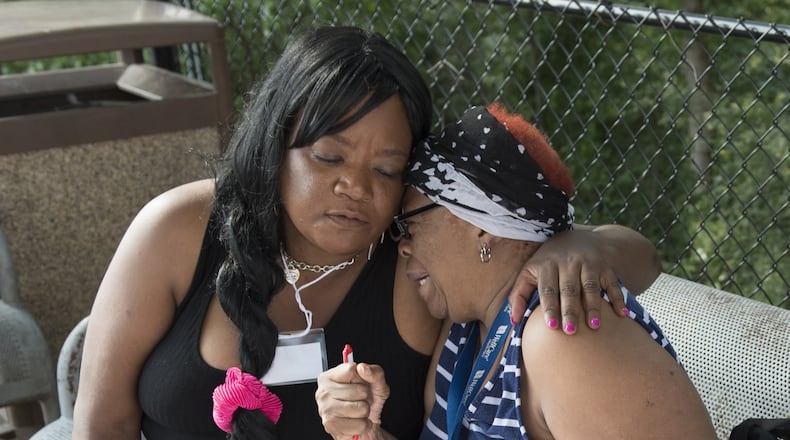Lashana Smith blinked through tears as she walked from Fulton County jail’s holding area into the arms of a dozen women she had never met.
“Happy Mother’s Day!” the strangers said.
“Thank you so much,” Smith, 38, replied, appearing dazed and even smaller than her five-foot-three frame. The mother of five was standing free in the lobby. She was in a T-shirt, blue jeans and black canvas shoes, instead of the jail uniforms she had worn for nearly a month. But it was still hard for her to believe that strangers, part of a grassroots collective called the Black Mamas Bail Out Coalition, had offered to pay her bail so she could return home for the holiday.
“I’m not the perfect mom, but I try to be a mom,” Smith said. “All of us are fallen.”
The nationwide, 16-city bailout targeted dozens of women being held on misdemeanor charges. The idea was hatched in Atlanta by members of Southerners on New Ground, a group that advocates for the LGBT community and others that is part of the national Black Lives Matter movement.
Research shows that defendants often sit behind bars, awaiting trial on low-level charges, because they can’t afford even a small bond.
The Black Mama’s Bail Out Coalition raised $520,000 nationally, $50,000 of which was budgeted for women at the Fulton County and Atlanta city jails, said Mary Hooks, co-director of SONG. The local coalition of more than a dozen groups, including activists and civil rights lawyers, secured the release of 17 black women in Atlanta during the two day effort, she said, and plan to release more because donations continue to pour in.
Research shows African-Americans bear the brunt of the cash bail system, both nationally and locally. A records request filed by the coalition found that of the 42 women in the city jail on April 10, only six were white. Charges faced by these women included crossing outside a crosswalk, blocking vehicular or pedestrian traffic and “use of fighting words,” the records show.
Bailing out inmates is easier said than done. The financial pressure forces low-income inmates to plead guilty to their charges to get out of jail as soon as possible, even when they are innocent, experts said.
If the women stay in too long, they can lose everything. Their jobs will go to other low-wage workers, their children may end up in state custody, and they likely will be evicted. But once they plead, they’re ineligible for help from bail reformers, and the conviction becomes part of their permanent record.
Smith was arrested in April for possession of less than one ounce of marijuana and a bench warrant from a missed court date concerning a 2014 misdemeanor battery charge. The battery charge was dropped May 1, but Smith remained in jail for the marijuana count, which she said carried a $300 bail. She didn’t want to ask her grown daughters for money because they have children of their own.
“I told them, ‘Don’t worry. The Lord would find a way for me to get home,’” she said.
Smith learned late Wednesday from a coalition attorney that the group was ready with cash on hand to bail her out, but the news was just hours late. She had entered a plea for the marijuana charge that day and was sentenced to time served.
“I cried all night. I had to get home to my daughter,” Smith said. She was released alongside the other women who had their bail paid by the effort, and met the activists Thursday afternoon with hugs and thanks anyway.
None of the women knew until late Wednesday that they were about to be set free. Donna Hogues, 48, who was being held on a $1,000 bond for shoplifting, was in awe.
“It’s wondrous,” she said as she stepped out the door.
It took more than two hours Thursday morning to post money and file paperwork for the first seven inmates the coalition set free. In addition to bail, inmates must pay 30 percent of that amount in state fees, plus a local jail charge of $20 per count.
The jail requires exact change, which sent the organizers fishing through their own pockets and driving back to the bank.
Volunteers set up tables next to the jail parking lot with pizza, chicken sandwiches, water bottles and gift bags filled with lists of jobs, mental health and other resources, plus beauty products, snacks and supplies. Smith was offered a ride home and invited to a free Mother’s Day homecoming meal that would connect the women to services such as job placement and housing.
Hooks offered Smith a cigarette, but she turned it down.
“I’m trying to quit,” Smith said, and sat down to eat a chicken biscuit.
Smith said she began using drugs and running the streets and got pregnant at 14, she said.
“I was too much. Off the chain,” Smith said. Her mother felt responsible for her daughter’s lifestyle and got sober to set a good example. She stayed that way for 13 years until she died, Smith said.
Now that she’s out, Smith has big plans and small ones. She hopes to visit the graves of her mother and sister. She wants to regain custody of her youngest daughter, 4, which she said she lost because of drug use. She wants to get her only son, 16, back in school. She wants to get her old job back as a cook.
Maybe she’ll make a meal for her family, her specialty of oxtail with giblet gravy, collard greens, and yellow rice.
First, she planned to board a bus, ride around and maybe see a little of the city. She has no permanent home and hoped one of her adult daughters would let her stay over.
“I wish everybody here a happy Mothers Day,” she said to the volunteers. Minutes later, she walked off by herself.
About the Author
The Latest
Featured






